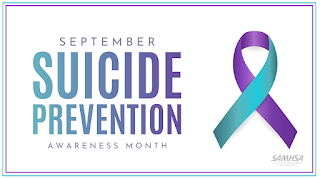The Grief of Adjusting to “The New Normal”
Way back in the spring, when Covid-19 began, we were all in a state of shock. What do you mean my children are learning at home? What do you mean my job is in the dining room instead of my office? What do you mean I can't go out to dinner or to the movies? At that time, I read an article called “ That Discomfort You're Feeling is Grief” (published March 23, 2020) in the Harvard Business Review. I recently reread this article and it still resonates with me. The beginning of the school year has always been full of joy and anticipation,as well as a healthy amount of anxiety. This year, I don't think I'm alone in feeling an unusually high level of anxiety. This year is not starting as any of us would like it to. I have more questions than we have answers. When will my kids go back to school? When will I go to work? How do I balance all of this? When will the virus let up and let me get on with my ordinary life? So many questions!
In this article, (That Discomfort You're Feeling is Grief) the author interviews grief expert Dr. David Kessler, founder of the website Grief.com, who describes several common grief experiences. He notes that it's important to acknowledge and discuss the grief that we are feeling because we will eventually find meaning in these experiences. He describes the “collective loss of normalcy,” along with the feeling that the world has changed, and not for the better. Many people are experiencing the fear of economic loss and the loss of connection to others. Dr. Kessler also mentioned something called “anticipatory grief.” He describes anticipatory grief as “the feeling we get about what the feeling holds when we are uncertain.” My goodness, there is a lot of uncertainty right now!
The question is, how do we handle all of this grief? First, he recommends trying to understand the stages of grief. Elisabeth Kubler-Ross, an American-Swiss psychiatrist, first defined these stages of grief in 1969.Typically, the stages of grief are as follows: denial, anger, bargaining, sadness and finally, acceptance. During Dr. Kessler’s later work with Dr. Kubler-Ross, a 6th stage was later added, finding meaning. Dr. Kessler does point out, however, that the stages are often not linear. This graphic ( used with the permission of Caring Choices) illustrates a more common grief progression. People don’t move smoothly between the stages, and that’s ok!
For handling this feeling of anticipatory grief, Dr. Kessler recommends acknowledging it for what it is, which is anxiety. He notes that trying to ignore these feelings isn’t effective, and probably won’t work anyway. He recommends striving for balance in our emotions and feelings about what might happen. He suggests balancing our thoughts by picturing the best possible outcome, even when our minds want to run to the worst. He also suggests that when fears of the future loom, we should try to come into the present. He recommends mindfulness practices, such as naming five things in the room or paying attention to immediate sensations.
A good example of this immediate mindfulness is provided by Destress Monday:
Dr. Kessler suggests focusing on the things which you can control, such as your own behaviors in staying safe (e.g., handwashing, maintaining distance, wearing a mask). He also advises focusing less on the behaviors of others, which we probably can't control anyway.
Dr. Kessler recommends that we “stock up on compassion.” Many are struggling with their feelings of grief and anxiety, and may act in ways which aren’t typical. People may be “Touchous,” as my grandma used to say, and need extra understanding from us if they snap or are moody. He also encourages us to remember that this is temporary. Although this uncomfortable situation may feel like it will last forever, it will not! (I need to keep telling myself this.)
Finally, for people who are overwhelmed, Dr. Kessler recommends naming our feelings of grief. It has been beneficial for me to acknowledge that I am struggling. Admitting to others that I had to quit watching the news because I couldn’t stop crying or because it was keeping me awake at night was healing. Every single time I shared these feelings, the person I was talking to acknowledged similar feelings. It was comforting to know that I was not alone. There is an old but accurate saying, “A burden shared is halved.” According to Dr. Kessler, we should allow ourselves to experience the feelings we are having without trying to talk ourselves out of them. He notes that too often people fear that if they admit to ‘bad feelings,’ they will be overrun. But he also says, “The truth is a feeling that moves through us. We feel it and then we go on to the next feeling.”




Comments
Post a Comment